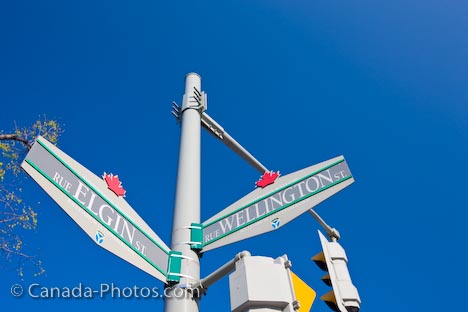I spent three weeks of June and July at a summer school and conference on geometric representation theory at the University of Ottawa. This conference is already mentioned on the mathematical blogosphere (I refuse to talk about the “blathosphere” or the “blathyscape”), at the Secret Blogging Seminar.
While I could talk about things I learned in Ottawa, that would be contrary to my recent practice on Concrete Nonsense — namely, not posting about math!
So instead, I’ll discuss something else I learned about in Ottawa: a simple, elegant solution to the problem of bilingual signs. As you can see in the photo, the street signs in Ottawa take advantage of the fact that Francophones speak of “Rue [name]” while Anglophones speak of “[name] Street” by a neat concatenation: “Rue [name] Street.”

Ottawa street signs: elegant concatenation
Let us generalize. Of course, signs other than street signs can be (and are) made in this way. But more importantly, we can generalize along the coordinate of language: One imagines a proper name in either English or Hebrew, followed by English text to the right and Hebrew text to the left. That is, while English-French signs glue “head-to-tail” linearly, English-Hebrew signs glue “tail-to-tail” linearly. Similarly, one could have right-angular signs with tail-to-tail English and (Ancient) Chinese.
Challenge: Come up with very, very clever examples and generalizatios along these lines.
The signs definitely mean something in English but are odd: “rue Wellington St”? Why should I feel remorse or regret for Wellington St?
In French, as far as my French goes, they don’t make any sense.
I’m not sure I agree the signs are elegant, they seem to be wrong in both languages.
(And yes, I am kidding. By the way, maybe your commenters can also come up with examples of other pairs of languages where the word for street –or avenue, or road, etc.– in one is a word in the other as well?)
By: Omar on July 14, 2009
at 3:12 AM
Well, they do make sense in French. How silly of me to say otherwise. For example “Rue Wellington St” announces a street whose name is Wellington St. Presumably it’s named after some street in some English speaking country, and not after any Wellington.
By: Omar on July 14, 2009
at 3:14 AM
Omar: I like your suggestion of failing to ignore the “wrong-language word.” Someone who knows some French should be able to modify this into a good joke…
By: Alexander Ellis on July 14, 2009
at 7:00 AM